The ORP Blyskawica Museum
30 VIII 1939 At 1:30 am we put the anchor up from Gdynia's waters and sailed West (?). Day has gone without events. 31 VIII 1939 At 12:30 (?) am battle alarm was ordered. At 1 am we met two running away Dutch warships. At 2am we went into (...)... at 6 am we went through (...) to North Sea. Night has gone without any events. At 9 am two German airplanes appeared which stayed with us for the whole day. There were few anti - aircraft alarms. Day has gone without events. At 9pm we have escaped German aircraft. Night has passed peacefully. We waited through battle watch.
1 IX 1939 Night has passed peacefully. At 10 (am?) we have received radiotelegraph message about breakout of German - Polish War. Message has been received by us 50 miles from English shores. At 2 pm two English PT boats (?) sailed towards us. At 5pm we dropped the anchor at (...) nearby Edinburgh in Scotland at (...) bay. Day has gone without any events. 2 IX 1939 Night from 1st to 2nd was peaceful. We still stand at (...). 3 IX 1939 Night from 2nd to 3rd has passed peacefully. At 11 (am?) England has declared was to Germany. At 5 pm France has declared war to Germany. Day has gone without any events. 4 IX 1939 Night from 3rd to 4th has passed peacefully...
 |
| ORP Blyskawica and Grom |
Commander Lieutenant from WW2 period
Mauser cal. 7.92 rifle from Radom Weapon Factory
VIS handgun 1935, cal. 9mm, from Radom Weapon Factory
Chatellaruault Hand Machine Gun 1924/29 cal. 7,5mm
Muser C96 Pistol
Artillery shrapnel from Hel peninsula
Telegraph from ORP Wilk Submarine

Part of diary about sinking Rio de Janerio: ... to improve on the face, or it just seems to be... 10 IV 1940 Yesterday at noon we stopped German ship under name of Rio de Janeiro. She did not want to stop at the beginning, but finally had to stop. She has dropped a boat that pretended to be closing up to us, but meanwhile ship has called for help - 'time has been playing up'. We have waited for half an hour, at last we got bored waiting until German aircraft arrived, or PT Boats which could 'liquidate' us and you would never have seen Jurek Dzidziczek (?). We got then bored with waiting and threw out a torpedo. It hit...


Flag from ORP Jastrzab with blood marks of its commander and model of ORP Jastrzab Submarine:
Jolly Roger flags put up by Allied Submarines returning from patrols, in Polsih Navy ORP Sokol and Dzik
 1 - Enemy merchant ship sunk
1 - Enemy merchant ship sunk2 - Enemy warship sunk
Bars above swastika mark Axis units sunk (German & Italian)
3 - Artillery duels
4 - Boarding
5 - Breaking through blocking nets
6 - Participation in Husky operation
Boleslaw Romanowski - born in 1910 in Wrklanach (Latvia). From 1920 lived in Grabowno. Graduated in National Gymnasium, in Szkola Podchorazych Marynarki Wojennej at Troun. In 1935 and 1937 done coursed of submarine sailing, in years of 1938 - 39 officers course of submarine weaponary. Before the war served at ORP Kujawiak, ORP Zbik, ORP Wilia, and ORP Wilk, on which took part in September Campaign and breakthrough through Baltic sea passes to United Kingdom. From 1941 1st officer on ORP Sokol. In the same year took command and led through Atlantic ORP Jastrzab. Wounded on 2nd May of 1942 during mistaken sinking ship by an escort of allied convoy PQ 15. In years 1942 - 44 took command of ORP Dzik. His war experience described in book "Torpeda w celu" (Torpedo in the Target). Returned to Poland in 1947 as a commander of ORP Blyskawica. Commanded ORP Sep and division of submarines. Arrested in 1950 and realesed from Polish Navy during Stalin's repressions. Was forced to leave the seaside, worked in Poznan and Bydgoszcz (in Poland), In 1956 on wave of political thaw rehabilitated and returned to Polish Navy. In 1961 - 64 re delegated as Captain of school tall ship Zawisza Czarny. In 1964 moved to reserve. Died in 1968 in Navy Hospital in Oliwa. Buried on Witominski Graveyard in Gdynia.
Warships of Polish Navy in World War 2
Organization of Polish Navy in Great Britain
Ranks in Polish Navy
Action Range of Polish Navy in 1939 - 1945
Within operation Pledge, 156 submarined have surrendered to allies. Part of them were given to victorious countries, few have been signed for scrap, 114 were decided to be sunk. Action has taken symbolic meaning and British command called it operation Deadlight. Operation started 28 of November 1945 and last until 20 of January 1946. From Scottish bay Loch Ryan, which is branch of Clyde, at 25 of November first 6 U boats have been carried to open sea. U Boats were pulled by 3 haulers accompanied by 3 destroyers and 2 frigates. ORP Blyskawica was one of the escorting destroyers. Convoy sailed into Atlantic and on 27 of November, miles from North Ireland, at place of 150 meters depth sinking of U boats has begun by detonation of explosion material inside hulls, after detonation U boats went straight down to the sea bed. At 6th of the U boats the cable got broken and explosion did not happen. It was decided to sink it by artillery fire, order given by British commander to ORP Blyskawica as distinction, commemoration of 7 September 1939, when Blyskawica performed first in WW2 attack on German submarine, damaging it. Other Polish destroyers also took part in operation Deadlight - Piorun and Krakowiak.
Lanchester submachine gun, cal. 9mm
Mosin Carbine, 44
ORP Blyskawica interior
ORP Blyskawica Boiler Room:


































































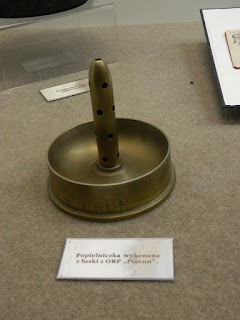
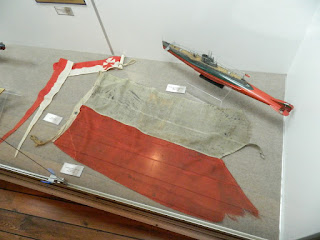



























































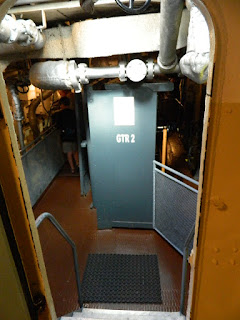


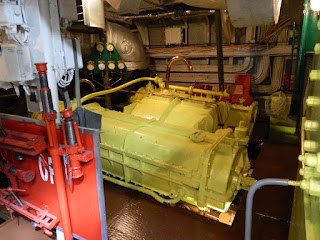






























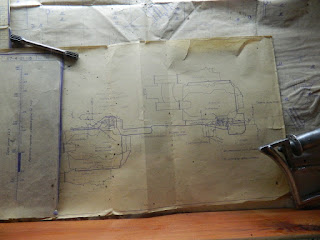









No comments:
Post a Comment